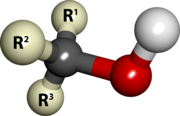
 |
Alcohol is created when grains, fruits, or vegetables are fermented, a process that uses yeast or bacteria to change the sugars in the food into alcohol. Alcohol has different forms and can be used as a cleaner or antiseptic; however the kind of alcohol that people drink is ethanol, which is a sedative. When alcohol is consumed, it's absorbed into a person's bloodstream. From there, it affects the central nervous system (the brain and spinal cord), which controls virtually all body functions. Alcohol actually blocks some of the messages trying to get to the brain. This alters a person's perceptions, emotions, movement, vision, and hearing. |

Alcohol abuse is when your drinking leads to problems, but not physical addiction.
People who have alcoholism or alcohol abuse often:
- Continue to drink, even when health, work, or family are being harmed
- Drink alone
- Become violent when drinking
- Become hostile when asked about drinking
- Are not able to control drinking -- being unable to stop or reduce alcohol intake
- Make excuses to drink
- Miss work or school, or have a decrease in performance because of drinking
- Stop taking part in activities because of alcohol
- Need to use alcohol on most days to get through the day
- Neglect to eat or eat poorly
- Do not care about or ignore how they dress or whether they are clean
- Try to hide alcohol use
- Shake in the morning or after periods when they have not a drink
- Symptoms of alcohol dependence include:
- Memory lapses after heavy drinking
- Needing more and more alcohol to feel "drunk"
- Alcohol withdrawal symptoms when you haven't had a drink for a while
- Alcohol-related illnesses such as alcoholic liver disease
|
|

